Business Society and Planet: Comparing Volkswagen and Ford's CSR
VerifiedAdded on 2021/06/17
|14
|3034
|36
Report
AI Summary
This report provides a comparative analysis of the corporate social responsibility (CSR) practices of Volkswagen and Ford, two major players in the automobile industry. It begins by identifying the core business activities of each company and then highlights the differences in their approaches to social, environmental, and economic issues, as presented in their CSR reports. The report examines the companies' sustainable development goals, including their strategies for reducing emissions, managing resources, and contributing to community development. It also assesses the quality of their social accounting approaches, using Zadek et al.'s criteria, and explores their organizational values. The report concludes with a reflection on the group discussions, providing insights into the challenges and opportunities related to business, society, and the planet. The analysis covers the companies' environmental impact, including emissions and fuel consumption, as well as their efforts to address issues such as transmission problems in Ford vehicles. The report also highlights Volkswagen's emissions scandal and the measures taken by both companies to improve their sustainability performance and contribute to a more responsible and sustainable future.
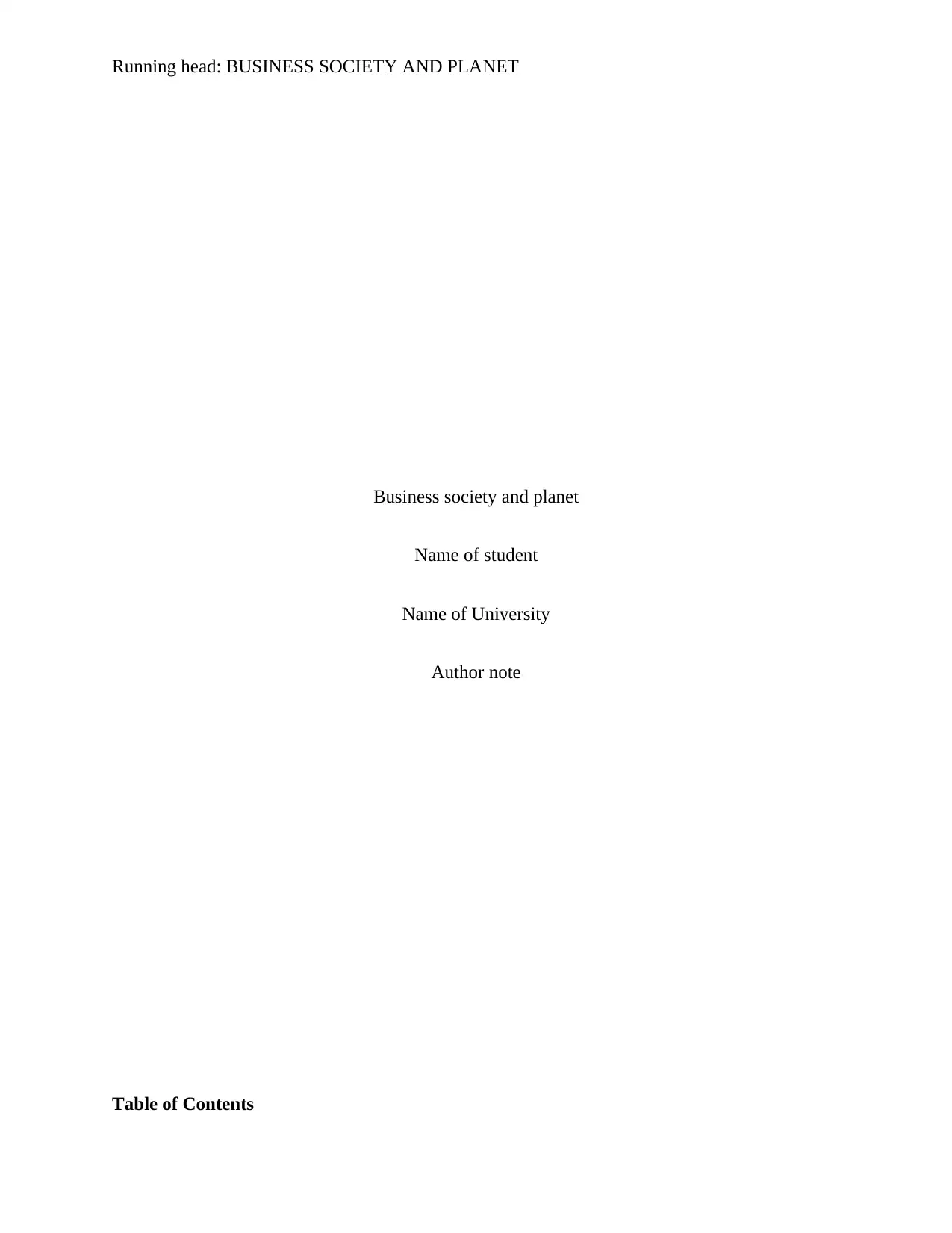
Running head: BUSINESS SOCIETY AND PLANET
Business society and planet
Name of student
Name of University
Author note
Table of Contents
Business society and planet
Name of student
Name of University
Author note
Table of Contents
Paraphrase This Document
Need a fresh take? Get an instant paraphrase of this document with our AI Paraphraser
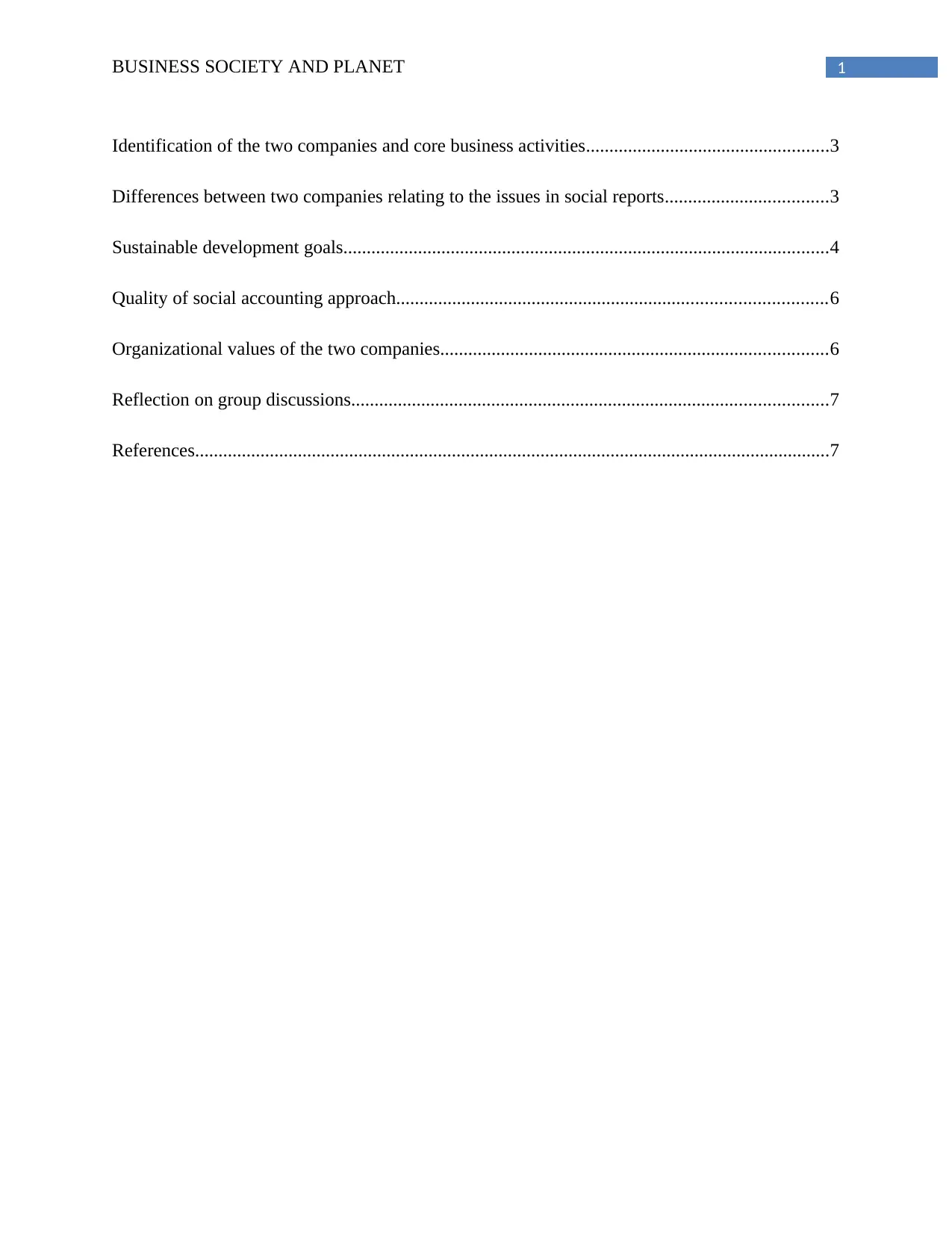
1BUSINESS SOCIETY AND PLANET
Identification of the two companies and core business activities....................................................3
Differences between two companies relating to the issues in social reports...................................3
Sustainable development goals........................................................................................................4
Quality of social accounting approach............................................................................................6
Organizational values of the two companies...................................................................................6
Reflection on group discussions......................................................................................................7
References........................................................................................................................................7
Identification of the two companies and core business activities....................................................3
Differences between two companies relating to the issues in social reports...................................3
Sustainable development goals........................................................................................................4
Quality of social accounting approach............................................................................................6
Organizational values of the two companies...................................................................................6
Reflection on group discussions......................................................................................................7
References........................................................................................................................................7
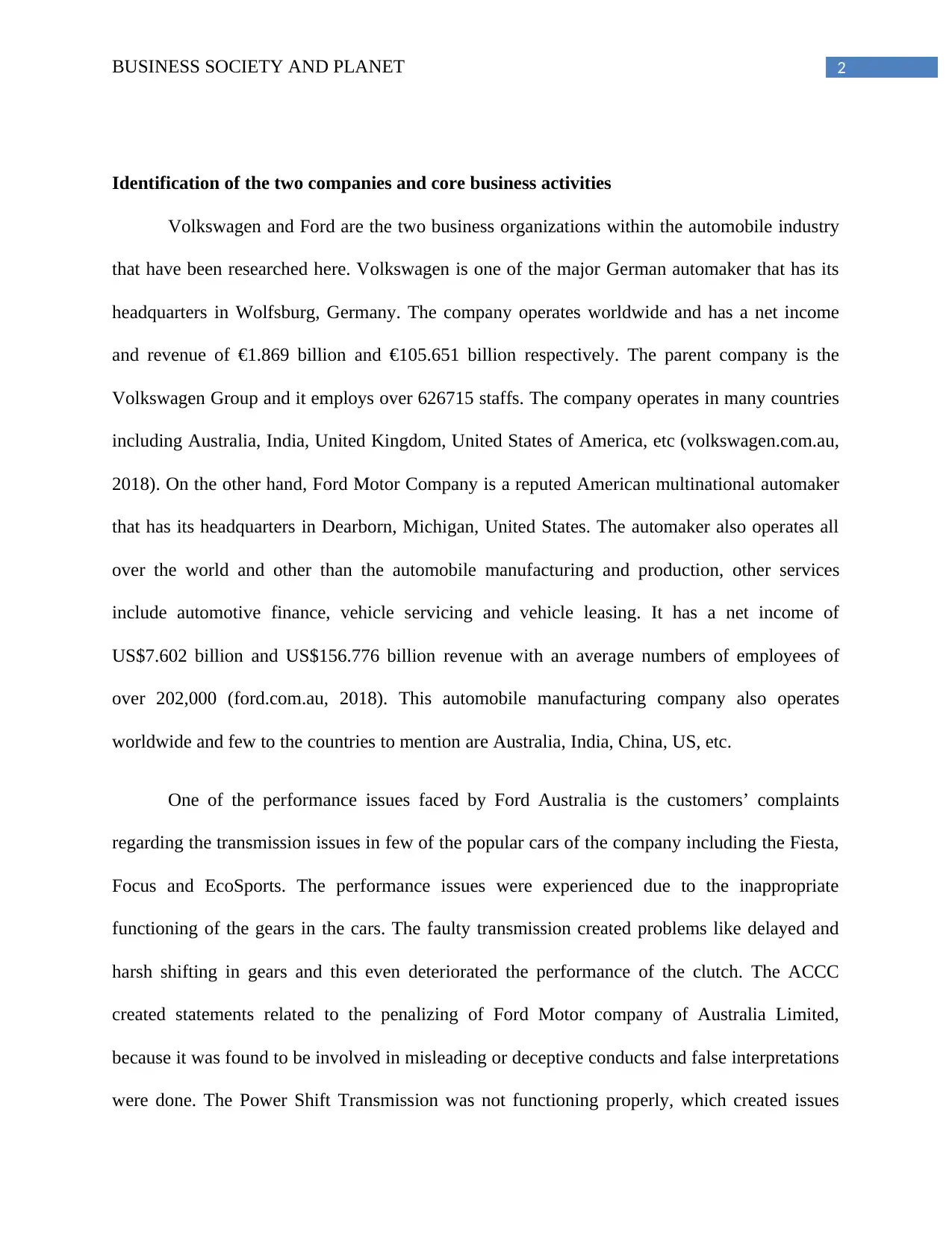
2BUSINESS SOCIETY AND PLANET
Identification of the two companies and core business activities
Volkswagen and Ford are the two business organizations within the automobile industry
that have been researched here. Volkswagen is one of the major German automaker that has its
headquarters in Wolfsburg, Germany. The company operates worldwide and has a net income
and revenue of €1.869 billion and €105.651 billion respectively. The parent company is the
Volkswagen Group and it employs over 626715 staffs. The company operates in many countries
including Australia, India, United Kingdom, United States of America, etc (volkswagen.com.au,
2018). On the other hand, Ford Motor Company is a reputed American multinational automaker
that has its headquarters in Dearborn, Michigan, United States. The automaker also operates all
over the world and other than the automobile manufacturing and production, other services
include automotive finance, vehicle servicing and vehicle leasing. It has a net income of
US$7.602 billion and US$156.776 billion revenue with an average numbers of employees of
over 202,000 (ford.com.au, 2018). This automobile manufacturing company also operates
worldwide and few to the countries to mention are Australia, India, China, US, etc.
One of the performance issues faced by Ford Australia is the customers’ complaints
regarding the transmission issues in few of the popular cars of the company including the Fiesta,
Focus and EcoSports. The performance issues were experienced due to the inappropriate
functioning of the gears in the cars. The faulty transmission created problems like delayed and
harsh shifting in gears and this even deteriorated the performance of the clutch. The ACCC
created statements related to the penalizing of Ford Motor company of Australia Limited,
because it was found to be involved in misleading or deceptive conducts and false interpretations
were done. The Power Shift Transmission was not functioning properly, which created issues
Identification of the two companies and core business activities
Volkswagen and Ford are the two business organizations within the automobile industry
that have been researched here. Volkswagen is one of the major German automaker that has its
headquarters in Wolfsburg, Germany. The company operates worldwide and has a net income
and revenue of €1.869 billion and €105.651 billion respectively. The parent company is the
Volkswagen Group and it employs over 626715 staffs. The company operates in many countries
including Australia, India, United Kingdom, United States of America, etc (volkswagen.com.au,
2018). On the other hand, Ford Motor Company is a reputed American multinational automaker
that has its headquarters in Dearborn, Michigan, United States. The automaker also operates all
over the world and other than the automobile manufacturing and production, other services
include automotive finance, vehicle servicing and vehicle leasing. It has a net income of
US$7.602 billion and US$156.776 billion revenue with an average numbers of employees of
over 202,000 (ford.com.au, 2018). This automobile manufacturing company also operates
worldwide and few to the countries to mention are Australia, India, China, US, etc.
One of the performance issues faced by Ford Australia is the customers’ complaints
regarding the transmission issues in few of the popular cars of the company including the Fiesta,
Focus and EcoSports. The performance issues were experienced due to the inappropriate
functioning of the gears in the cars. The faulty transmission created problems like delayed and
harsh shifting in gears and this even deteriorated the performance of the clutch. The ACCC
created statements related to the penalizing of Ford Motor company of Australia Limited,
because it was found to be involved in misleading or deceptive conducts and false interpretations
were done. The Power Shift Transmission was not functioning properly, which created issues
⊘ This is a preview!⊘
Do you want full access?
Subscribe today to unlock all pages.

Trusted by 1+ million students worldwide
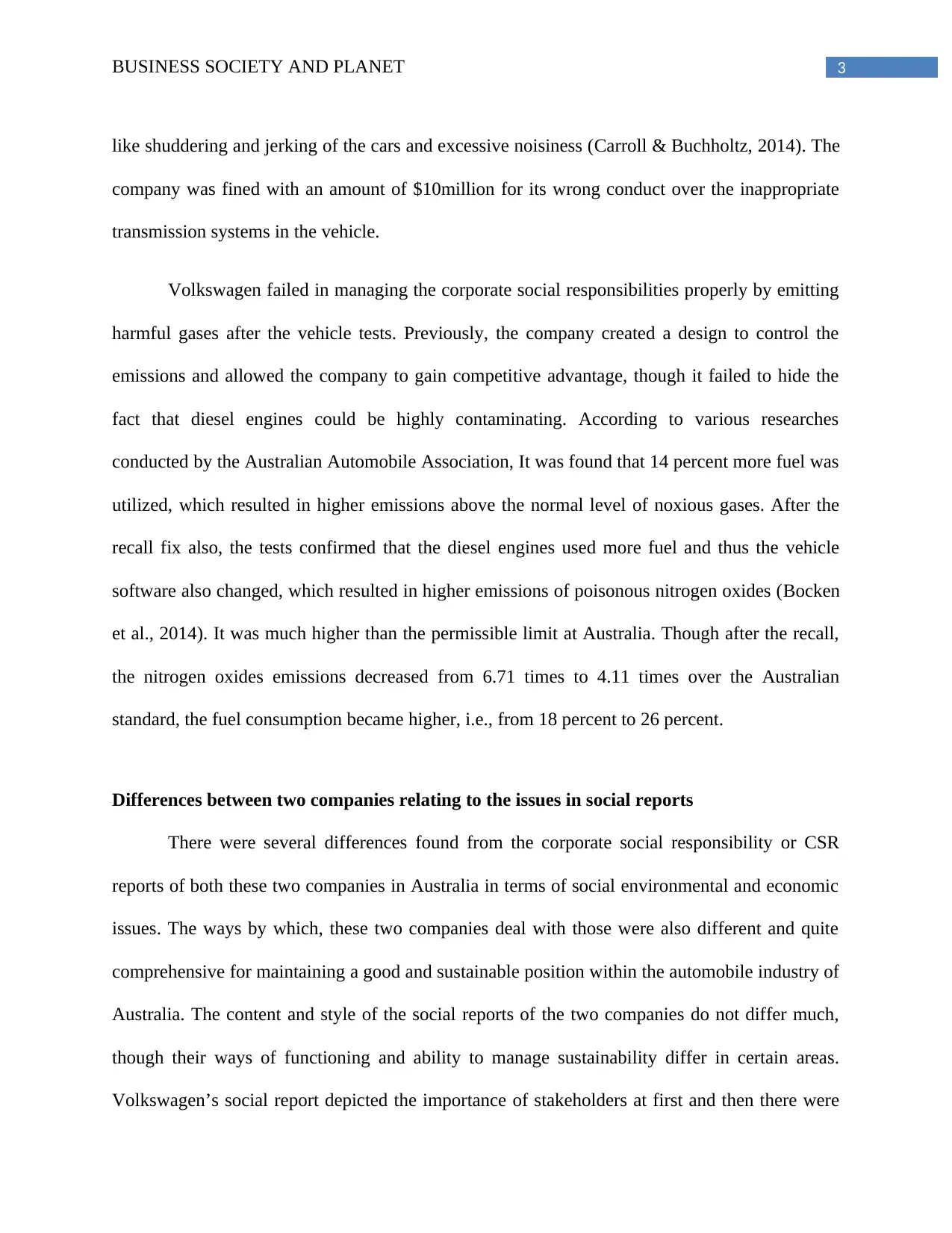
3BUSINESS SOCIETY AND PLANET
like shuddering and jerking of the cars and excessive noisiness (Carroll & Buchholtz, 2014). The
company was fined with an amount of $10million for its wrong conduct over the inappropriate
transmission systems in the vehicle.
Volkswagen failed in managing the corporate social responsibilities properly by emitting
harmful gases after the vehicle tests. Previously, the company created a design to control the
emissions and allowed the company to gain competitive advantage, though it failed to hide the
fact that diesel engines could be highly contaminating. According to various researches
conducted by the Australian Automobile Association, It was found that 14 percent more fuel was
utilized, which resulted in higher emissions above the normal level of noxious gases. After the
recall fix also, the tests confirmed that the diesel engines used more fuel and thus the vehicle
software also changed, which resulted in higher emissions of poisonous nitrogen oxides (Bocken
et al., 2014). It was much higher than the permissible limit at Australia. Though after the recall,
the nitrogen oxides emissions decreased from 6.71 times to 4.11 times over the Australian
standard, the fuel consumption became higher, i.e., from 18 percent to 26 percent.
Differences between two companies relating to the issues in social reports
There were several differences found from the corporate social responsibility or CSR
reports of both these two companies in Australia in terms of social environmental and economic
issues. The ways by which, these two companies deal with those were also different and quite
comprehensive for maintaining a good and sustainable position within the automobile industry of
Australia. The content and style of the social reports of the two companies do not differ much,
though their ways of functioning and ability to manage sustainability differ in certain areas.
Volkswagen’s social report depicted the importance of stakeholders at first and then there were
like shuddering and jerking of the cars and excessive noisiness (Carroll & Buchholtz, 2014). The
company was fined with an amount of $10million for its wrong conduct over the inappropriate
transmission systems in the vehicle.
Volkswagen failed in managing the corporate social responsibilities properly by emitting
harmful gases after the vehicle tests. Previously, the company created a design to control the
emissions and allowed the company to gain competitive advantage, though it failed to hide the
fact that diesel engines could be highly contaminating. According to various researches
conducted by the Australian Automobile Association, It was found that 14 percent more fuel was
utilized, which resulted in higher emissions above the normal level of noxious gases. After the
recall fix also, the tests confirmed that the diesel engines used more fuel and thus the vehicle
software also changed, which resulted in higher emissions of poisonous nitrogen oxides (Bocken
et al., 2014). It was much higher than the permissible limit at Australia. Though after the recall,
the nitrogen oxides emissions decreased from 6.71 times to 4.11 times over the Australian
standard, the fuel consumption became higher, i.e., from 18 percent to 26 percent.
Differences between two companies relating to the issues in social reports
There were several differences found from the corporate social responsibility or CSR
reports of both these two companies in Australia in terms of social environmental and economic
issues. The ways by which, these two companies deal with those were also different and quite
comprehensive for maintaining a good and sustainable position within the automobile industry of
Australia. The content and style of the social reports of the two companies do not differ much,
though their ways of functioning and ability to manage sustainability differ in certain areas.
Volkswagen’s social report depicted the importance of stakeholders at first and then there were
Paraphrase This Document
Need a fresh take? Get an instant paraphrase of this document with our AI Paraphraser
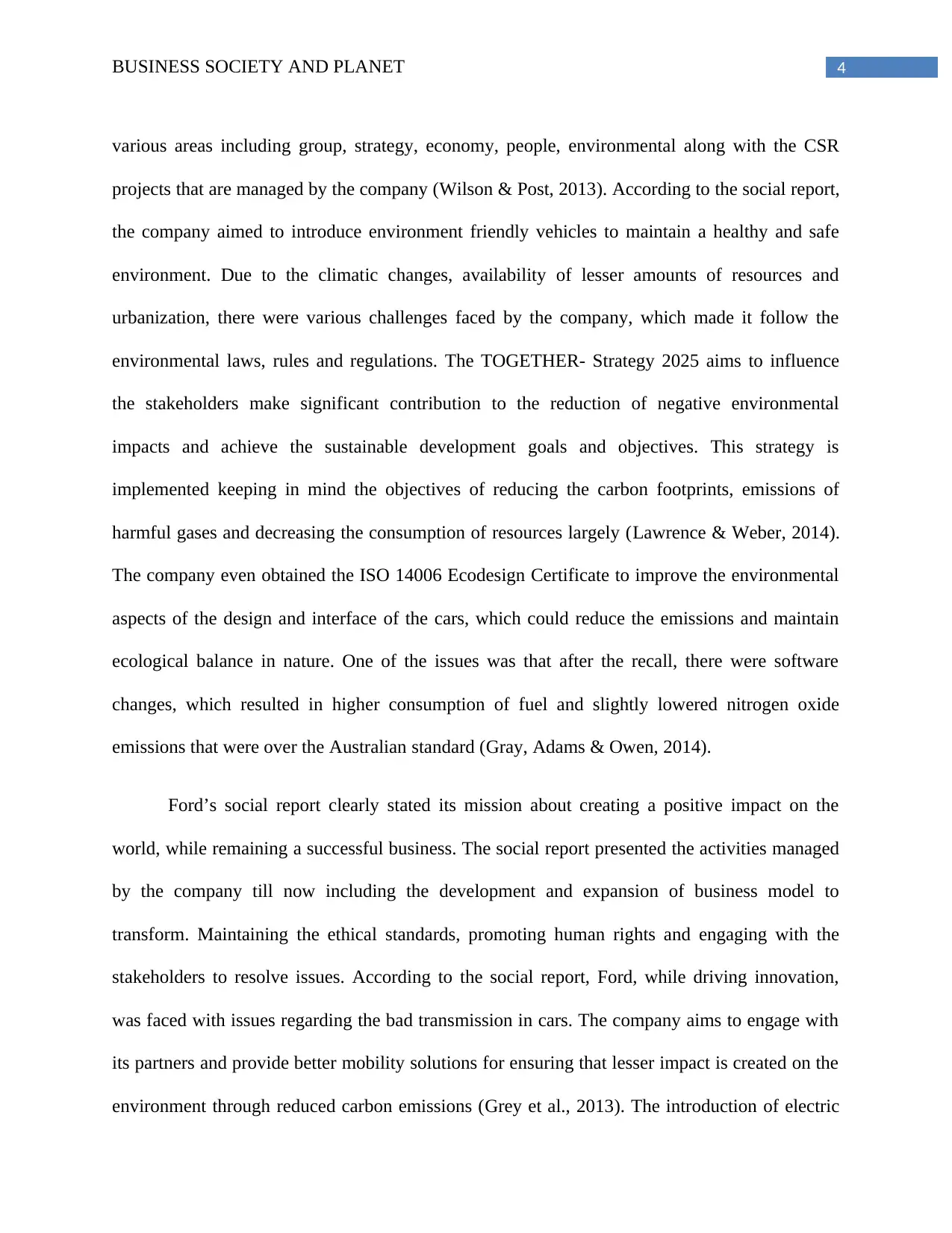
4BUSINESS SOCIETY AND PLANET
various areas including group, strategy, economy, people, environmental along with the CSR
projects that are managed by the company (Wilson & Post, 2013). According to the social report,
the company aimed to introduce environment friendly vehicles to maintain a healthy and safe
environment. Due to the climatic changes, availability of lesser amounts of resources and
urbanization, there were various challenges faced by the company, which made it follow the
environmental laws, rules and regulations. The TOGETHER- Strategy 2025 aims to influence
the stakeholders make significant contribution to the reduction of negative environmental
impacts and achieve the sustainable development goals and objectives. This strategy is
implemented keeping in mind the objectives of reducing the carbon footprints, emissions of
harmful gases and decreasing the consumption of resources largely (Lawrence & Weber, 2014).
The company even obtained the ISO 14006 Ecodesign Certificate to improve the environmental
aspects of the design and interface of the cars, which could reduce the emissions and maintain
ecological balance in nature. One of the issues was that after the recall, there were software
changes, which resulted in higher consumption of fuel and slightly lowered nitrogen oxide
emissions that were over the Australian standard (Gray, Adams & Owen, 2014).
Ford’s social report clearly stated its mission about creating a positive impact on the
world, while remaining a successful business. The social report presented the activities managed
by the company till now including the development and expansion of business model to
transform. Maintaining the ethical standards, promoting human rights and engaging with the
stakeholders to resolve issues. According to the social report, Ford, while driving innovation,
was faced with issues regarding the bad transmission in cars. The company aims to engage with
its partners and provide better mobility solutions for ensuring that lesser impact is created on the
environment through reduced carbon emissions (Grey et al., 2013). The introduction of electric
various areas including group, strategy, economy, people, environmental along with the CSR
projects that are managed by the company (Wilson & Post, 2013). According to the social report,
the company aimed to introduce environment friendly vehicles to maintain a healthy and safe
environment. Due to the climatic changes, availability of lesser amounts of resources and
urbanization, there were various challenges faced by the company, which made it follow the
environmental laws, rules and regulations. The TOGETHER- Strategy 2025 aims to influence
the stakeholders make significant contribution to the reduction of negative environmental
impacts and achieve the sustainable development goals and objectives. This strategy is
implemented keeping in mind the objectives of reducing the carbon footprints, emissions of
harmful gases and decreasing the consumption of resources largely (Lawrence & Weber, 2014).
The company even obtained the ISO 14006 Ecodesign Certificate to improve the environmental
aspects of the design and interface of the cars, which could reduce the emissions and maintain
ecological balance in nature. One of the issues was that after the recall, there were software
changes, which resulted in higher consumption of fuel and slightly lowered nitrogen oxide
emissions that were over the Australian standard (Gray, Adams & Owen, 2014).
Ford’s social report clearly stated its mission about creating a positive impact on the
world, while remaining a successful business. The social report presented the activities managed
by the company till now including the development and expansion of business model to
transform. Maintaining the ethical standards, promoting human rights and engaging with the
stakeholders to resolve issues. According to the social report, Ford, while driving innovation,
was faced with issues regarding the bad transmission in cars. The company aims to engage with
its partners and provide better mobility solutions for ensuring that lesser impact is created on the
environment through reduced carbon emissions (Grey et al., 2013). The introduction of electric
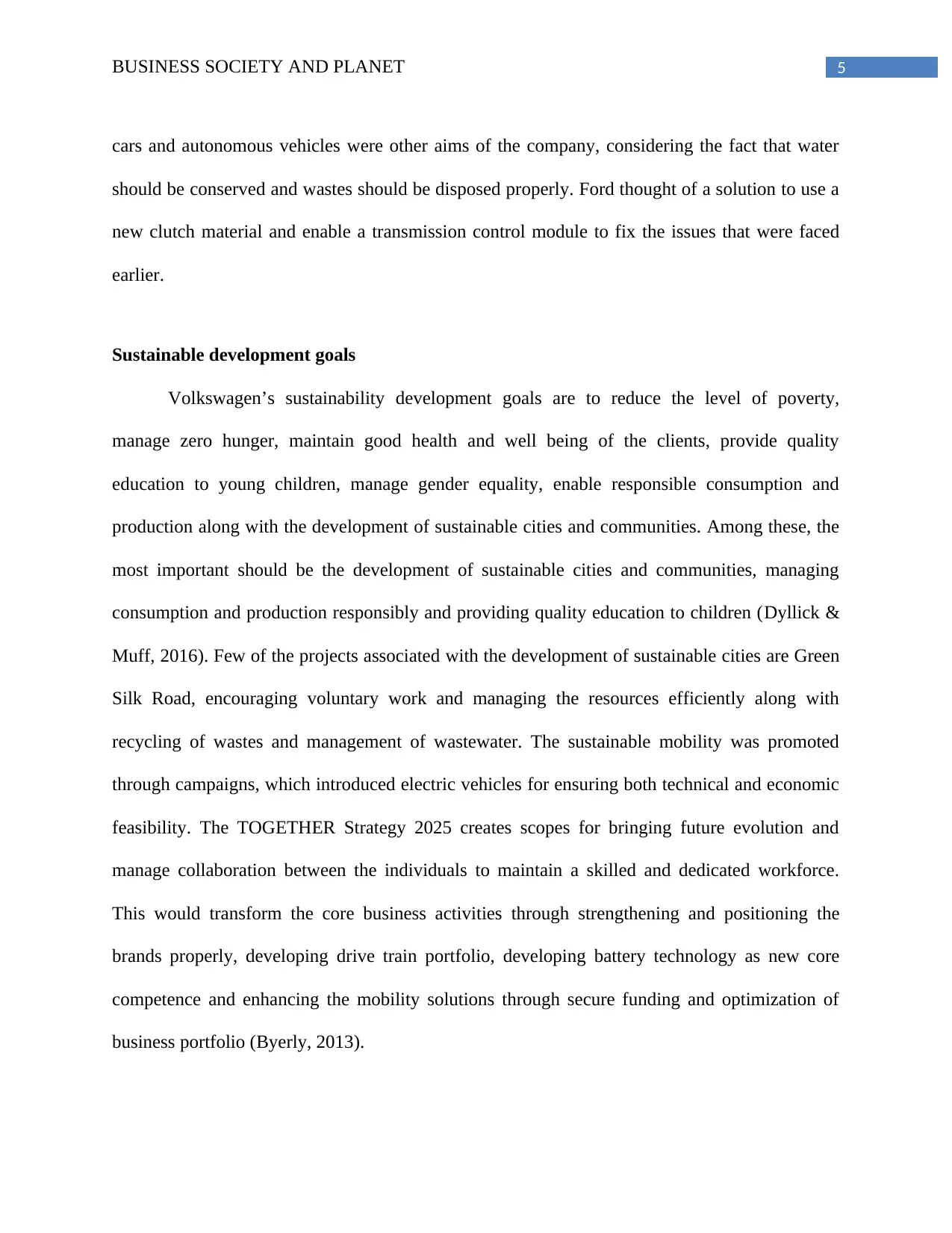
5BUSINESS SOCIETY AND PLANET
cars and autonomous vehicles were other aims of the company, considering the fact that water
should be conserved and wastes should be disposed properly. Ford thought of a solution to use a
new clutch material and enable a transmission control module to fix the issues that were faced
earlier.
Sustainable development goals
Volkswagen’s sustainability development goals are to reduce the level of poverty,
manage zero hunger, maintain good health and well being of the clients, provide quality
education to young children, manage gender equality, enable responsible consumption and
production along with the development of sustainable cities and communities. Among these, the
most important should be the development of sustainable cities and communities, managing
consumption and production responsibly and providing quality education to children (Dyllick &
Muff, 2016). Few of the projects associated with the development of sustainable cities are Green
Silk Road, encouraging voluntary work and managing the resources efficiently along with
recycling of wastes and management of wastewater. The sustainable mobility was promoted
through campaigns, which introduced electric vehicles for ensuring both technical and economic
feasibility. The TOGETHER Strategy 2025 creates scopes for bringing future evolution and
manage collaboration between the individuals to maintain a skilled and dedicated workforce.
This would transform the core business activities through strengthening and positioning the
brands properly, developing drive train portfolio, developing battery technology as new core
competence and enhancing the mobility solutions through secure funding and optimization of
business portfolio (Byerly, 2013).
cars and autonomous vehicles were other aims of the company, considering the fact that water
should be conserved and wastes should be disposed properly. Ford thought of a solution to use a
new clutch material and enable a transmission control module to fix the issues that were faced
earlier.
Sustainable development goals
Volkswagen’s sustainability development goals are to reduce the level of poverty,
manage zero hunger, maintain good health and well being of the clients, provide quality
education to young children, manage gender equality, enable responsible consumption and
production along with the development of sustainable cities and communities. Among these, the
most important should be the development of sustainable cities and communities, managing
consumption and production responsibly and providing quality education to children (Dyllick &
Muff, 2016). Few of the projects associated with the development of sustainable cities are Green
Silk Road, encouraging voluntary work and managing the resources efficiently along with
recycling of wastes and management of wastewater. The sustainable mobility was promoted
through campaigns, which introduced electric vehicles for ensuring both technical and economic
feasibility. The TOGETHER Strategy 2025 creates scopes for bringing future evolution and
manage collaboration between the individuals to maintain a skilled and dedicated workforce.
This would transform the core business activities through strengthening and positioning the
brands properly, developing drive train portfolio, developing battery technology as new core
competence and enhancing the mobility solutions through secure funding and optimization of
business portfolio (Byerly, 2013).
⊘ This is a preview!⊘
Do you want full access?
Subscribe today to unlock all pages.

Trusted by 1+ million students worldwide
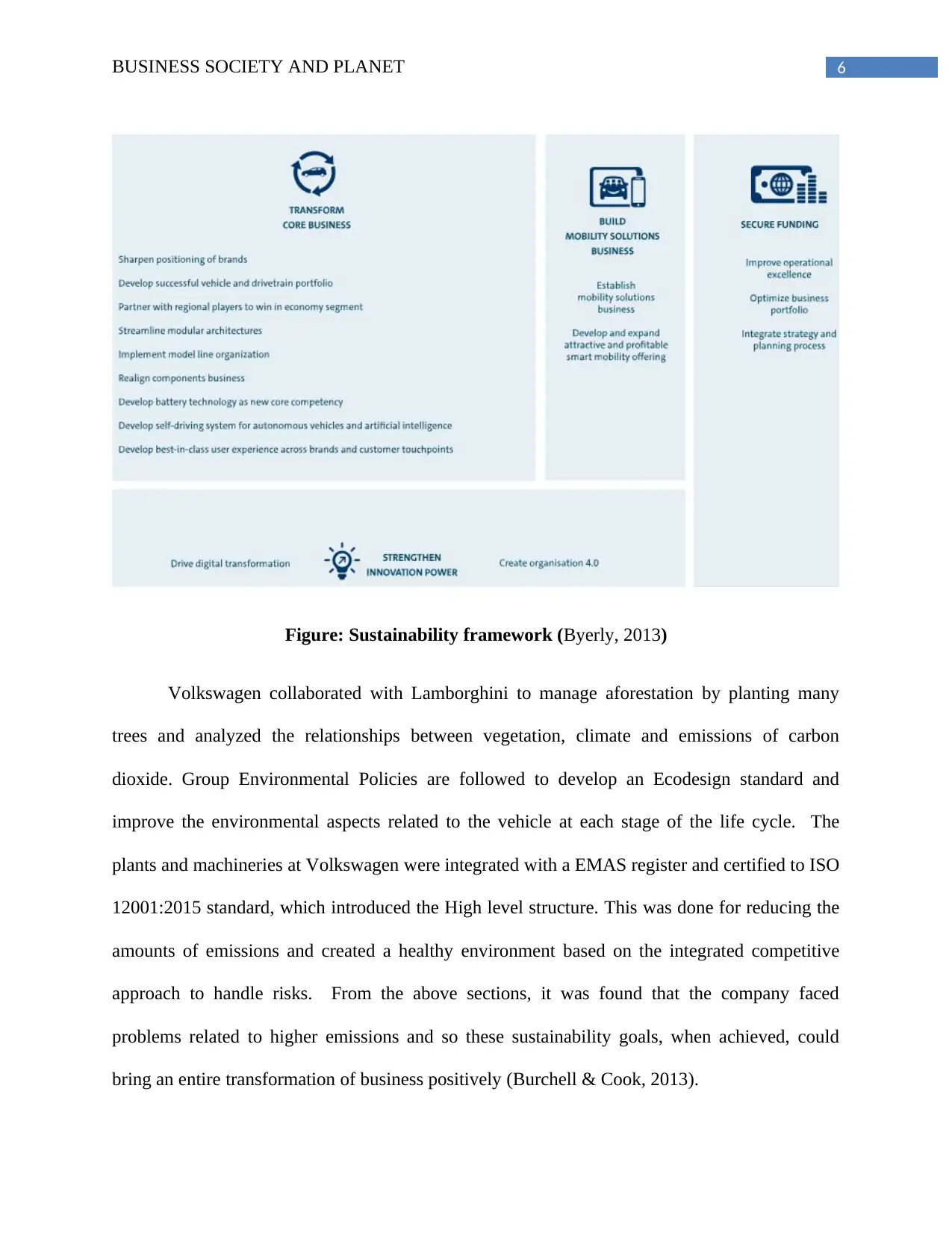
6BUSINESS SOCIETY AND PLANET
Figure: Sustainability framework (Byerly, 2013)
Volkswagen collaborated with Lamborghini to manage aforestation by planting many
trees and analyzed the relationships between vegetation, climate and emissions of carbon
dioxide. Group Environmental Policies are followed to develop an Ecodesign standard and
improve the environmental aspects related to the vehicle at each stage of the life cycle. The
plants and machineries at Volkswagen were integrated with a EMAS register and certified to ISO
12001:2015 standard, which introduced the High level structure. This was done for reducing the
amounts of emissions and created a healthy environment based on the integrated competitive
approach to handle risks. From the above sections, it was found that the company faced
problems related to higher emissions and so these sustainability goals, when achieved, could
bring an entire transformation of business positively (Burchell & Cook, 2013).
Figure: Sustainability framework (Byerly, 2013)
Volkswagen collaborated with Lamborghini to manage aforestation by planting many
trees and analyzed the relationships between vegetation, climate and emissions of carbon
dioxide. Group Environmental Policies are followed to develop an Ecodesign standard and
improve the environmental aspects related to the vehicle at each stage of the life cycle. The
plants and machineries at Volkswagen were integrated with a EMAS register and certified to ISO
12001:2015 standard, which introduced the High level structure. This was done for reducing the
amounts of emissions and created a healthy environment based on the integrated competitive
approach to handle risks. From the above sections, it was found that the company faced
problems related to higher emissions and so these sustainability goals, when achieved, could
bring an entire transformation of business positively (Burchell & Cook, 2013).
Paraphrase This Document
Need a fresh take? Get an instant paraphrase of this document with our AI Paraphraser
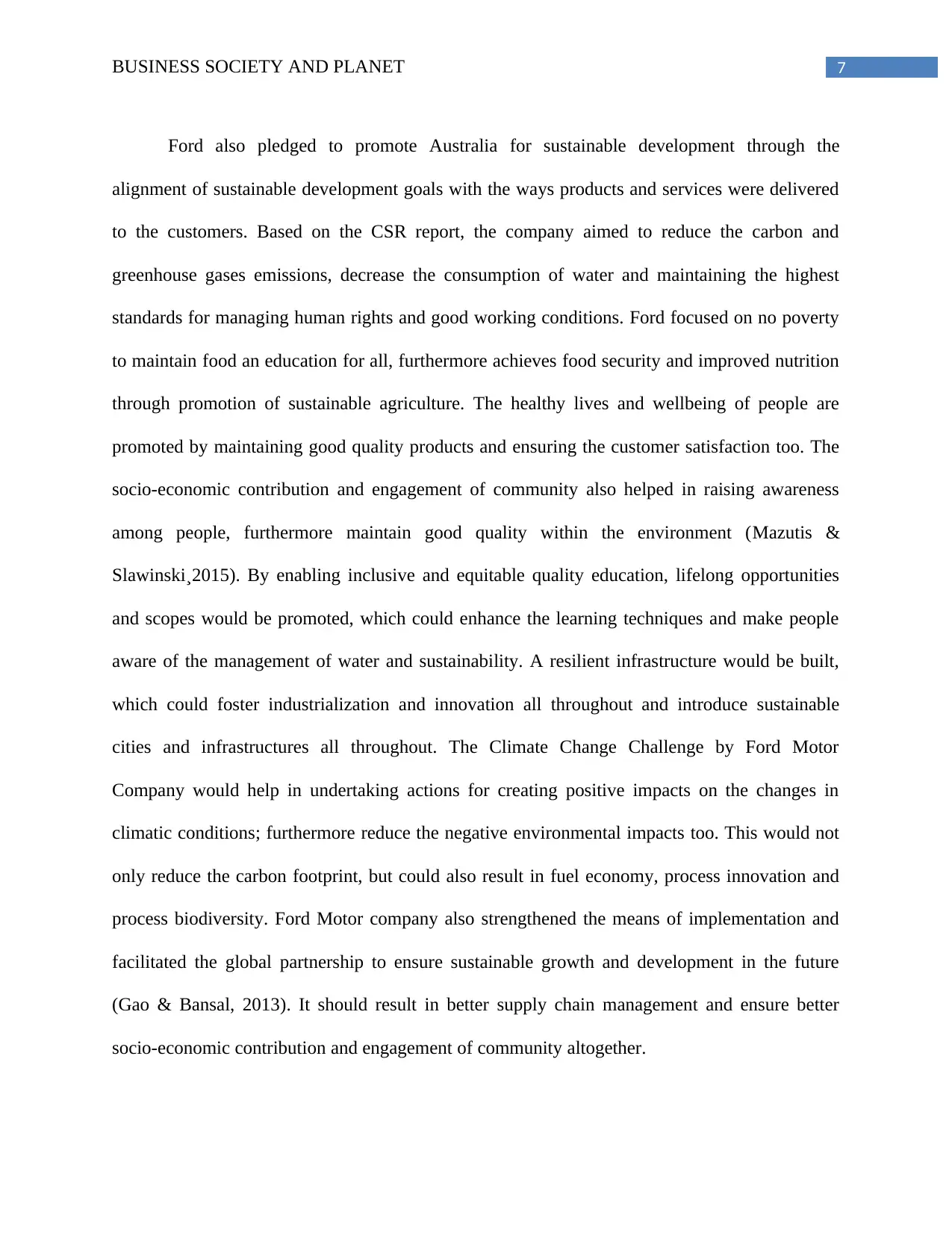
7BUSINESS SOCIETY AND PLANET
Ford also pledged to promote Australia for sustainable development through the
alignment of sustainable development goals with the ways products and services were delivered
to the customers. Based on the CSR report, the company aimed to reduce the carbon and
greenhouse gases emissions, decrease the consumption of water and maintaining the highest
standards for managing human rights and good working conditions. Ford focused on no poverty
to maintain food an education for all, furthermore achieves food security and improved nutrition
through promotion of sustainable agriculture. The healthy lives and wellbeing of people are
promoted by maintaining good quality products and ensuring the customer satisfaction too. The
socio-economic contribution and engagement of community also helped in raising awareness
among people, furthermore maintain good quality within the environment (Mazutis &
Slawinski¸2015). By enabling inclusive and equitable quality education, lifelong opportunities
and scopes would be promoted, which could enhance the learning techniques and make people
aware of the management of water and sustainability. A resilient infrastructure would be built,
which could foster industrialization and innovation all throughout and introduce sustainable
cities and infrastructures all throughout. The Climate Change Challenge by Ford Motor
Company would help in undertaking actions for creating positive impacts on the changes in
climatic conditions; furthermore reduce the negative environmental impacts too. This would not
only reduce the carbon footprint, but could also result in fuel economy, process innovation and
process biodiversity. Ford Motor company also strengthened the means of implementation and
facilitated the global partnership to ensure sustainable growth and development in the future
(Gao & Bansal, 2013). It should result in better supply chain management and ensure better
socio-economic contribution and engagement of community altogether.
Ford also pledged to promote Australia for sustainable development through the
alignment of sustainable development goals with the ways products and services were delivered
to the customers. Based on the CSR report, the company aimed to reduce the carbon and
greenhouse gases emissions, decrease the consumption of water and maintaining the highest
standards for managing human rights and good working conditions. Ford focused on no poverty
to maintain food an education for all, furthermore achieves food security and improved nutrition
through promotion of sustainable agriculture. The healthy lives and wellbeing of people are
promoted by maintaining good quality products and ensuring the customer satisfaction too. The
socio-economic contribution and engagement of community also helped in raising awareness
among people, furthermore maintain good quality within the environment (Mazutis &
Slawinski¸2015). By enabling inclusive and equitable quality education, lifelong opportunities
and scopes would be promoted, which could enhance the learning techniques and make people
aware of the management of water and sustainability. A resilient infrastructure would be built,
which could foster industrialization and innovation all throughout and introduce sustainable
cities and infrastructures all throughout. The Climate Change Challenge by Ford Motor
Company would help in undertaking actions for creating positive impacts on the changes in
climatic conditions; furthermore reduce the negative environmental impacts too. This would not
only reduce the carbon footprint, but could also result in fuel economy, process innovation and
process biodiversity. Ford Motor company also strengthened the means of implementation and
facilitated the global partnership to ensure sustainable growth and development in the future
(Gao & Bansal, 2013). It should result in better supply chain management and ensure better
socio-economic contribution and engagement of community altogether.
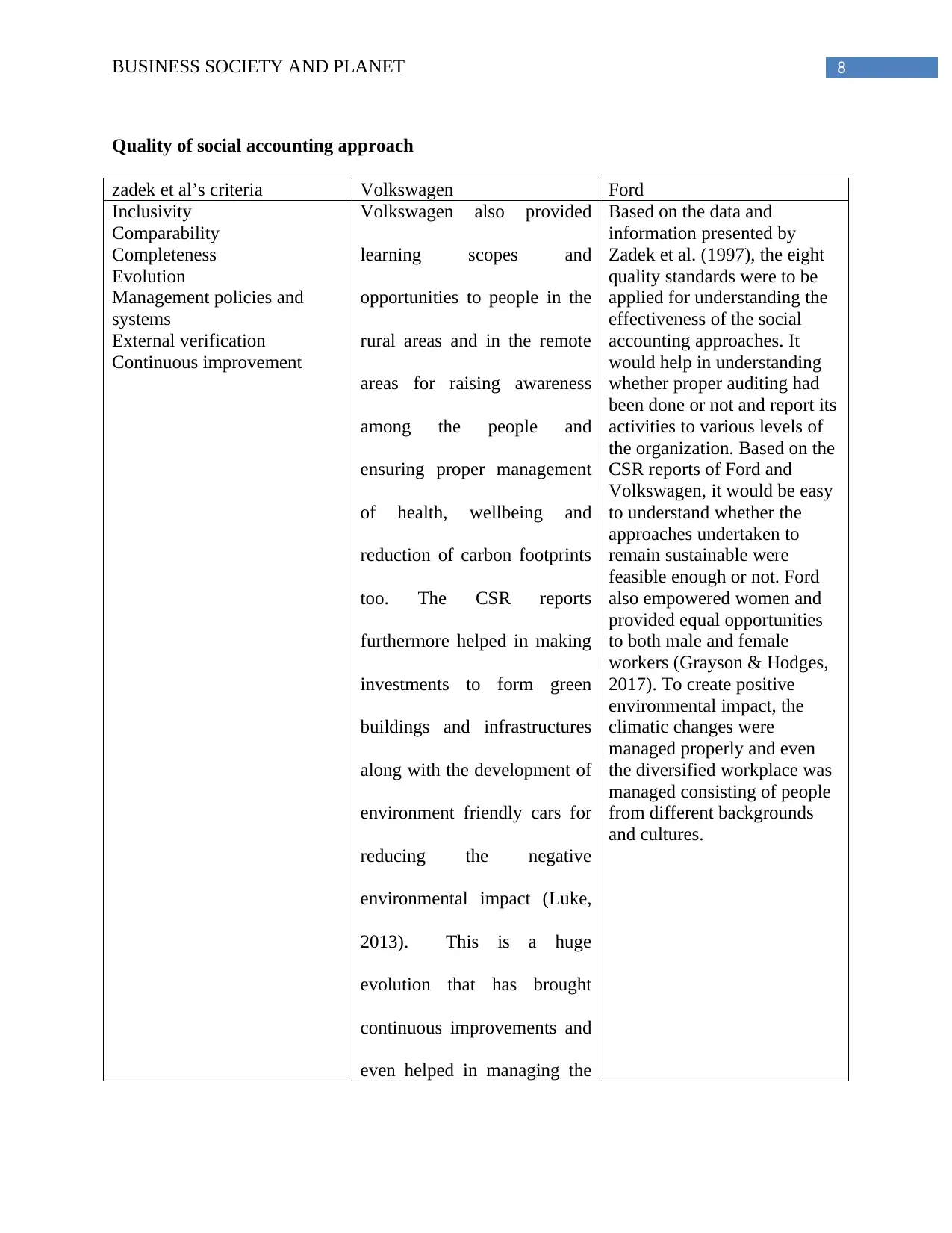
8BUSINESS SOCIETY AND PLANET
Quality of social accounting approach
zadek et al’s criteria Volkswagen Ford
Inclusivity
Comparability
Completeness
Evolution
Management policies and
systems
External verification
Continuous improvement
Volkswagen also provided
learning scopes and
opportunities to people in the
rural areas and in the remote
areas for raising awareness
among the people and
ensuring proper management
of health, wellbeing and
reduction of carbon footprints
too. The CSR reports
furthermore helped in making
investments to form green
buildings and infrastructures
along with the development of
environment friendly cars for
reducing the negative
environmental impact (Luke,
2013). This is a huge
evolution that has brought
continuous improvements and
even helped in managing the
Based on the data and
information presented by
Zadek et al. (1997), the eight
quality standards were to be
applied for understanding the
effectiveness of the social
accounting approaches. It
would help in understanding
whether proper auditing had
been done or not and report its
activities to various levels of
the organization. Based on the
CSR reports of Ford and
Volkswagen, it would be easy
to understand whether the
approaches undertaken to
remain sustainable were
feasible enough or not. Ford
also empowered women and
provided equal opportunities
to both male and female
workers (Grayson & Hodges,
2017). To create positive
environmental impact, the
climatic changes were
managed properly and even
the diversified workplace was
managed consisting of people
from different backgrounds
and cultures.
Quality of social accounting approach
zadek et al’s criteria Volkswagen Ford
Inclusivity
Comparability
Completeness
Evolution
Management policies and
systems
External verification
Continuous improvement
Volkswagen also provided
learning scopes and
opportunities to people in the
rural areas and in the remote
areas for raising awareness
among the people and
ensuring proper management
of health, wellbeing and
reduction of carbon footprints
too. The CSR reports
furthermore helped in making
investments to form green
buildings and infrastructures
along with the development of
environment friendly cars for
reducing the negative
environmental impact (Luke,
2013). This is a huge
evolution that has brought
continuous improvements and
even helped in managing the
Based on the data and
information presented by
Zadek et al. (1997), the eight
quality standards were to be
applied for understanding the
effectiveness of the social
accounting approaches. It
would help in understanding
whether proper auditing had
been done or not and report its
activities to various levels of
the organization. Based on the
CSR reports of Ford and
Volkswagen, it would be easy
to understand whether the
approaches undertaken to
remain sustainable were
feasible enough or not. Ford
also empowered women and
provided equal opportunities
to both male and female
workers (Grayson & Hodges,
2017). To create positive
environmental impact, the
climatic changes were
managed properly and even
the diversified workplace was
managed consisting of people
from different backgrounds
and cultures.
⊘ This is a preview!⊘
Do you want full access?
Subscribe today to unlock all pages.

Trusted by 1+ million students worldwide
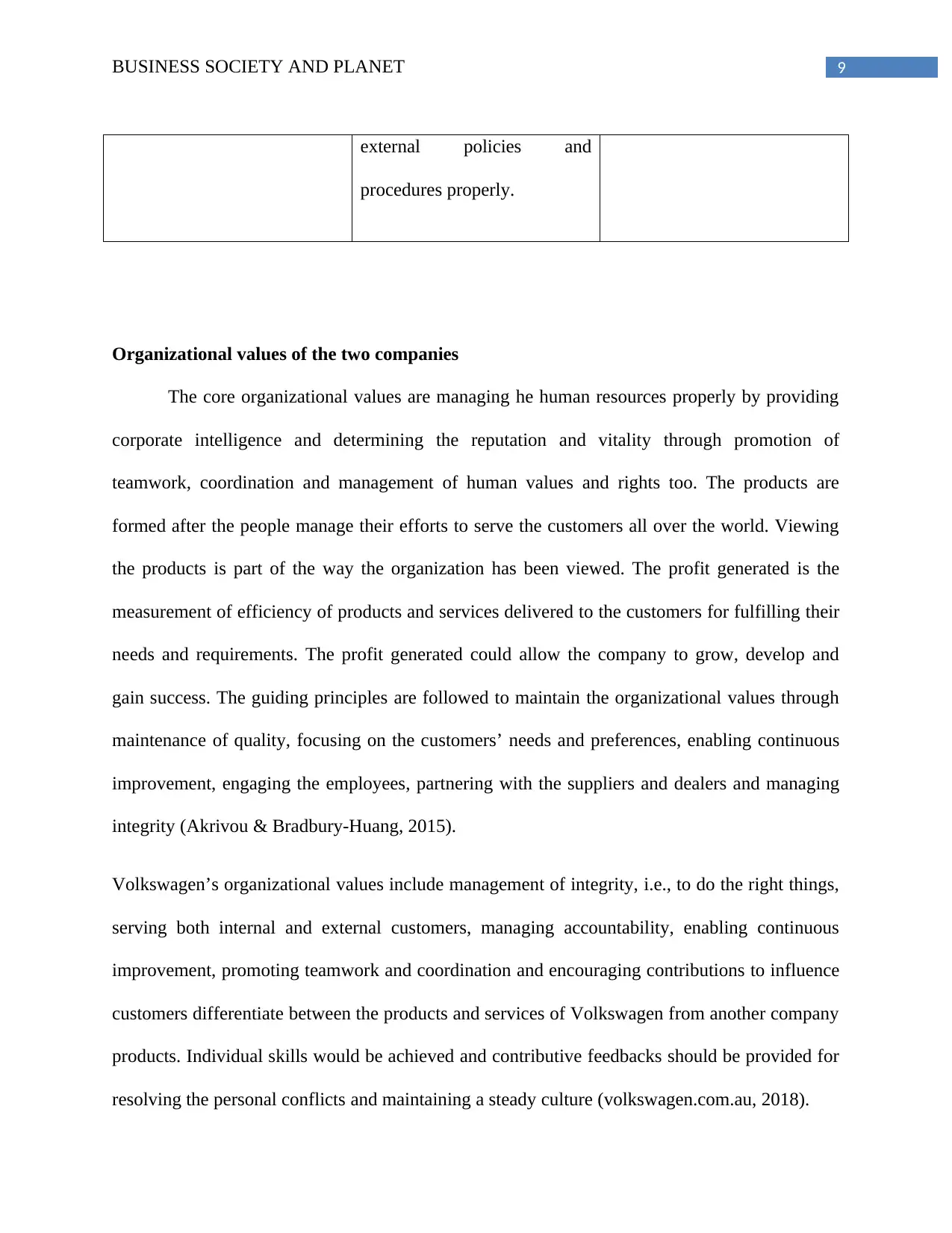
9BUSINESS SOCIETY AND PLANET
external policies and
procedures properly.
Organizational values of the two companies
The core organizational values are managing he human resources properly by providing
corporate intelligence and determining the reputation and vitality through promotion of
teamwork, coordination and management of human values and rights too. The products are
formed after the people manage their efforts to serve the customers all over the world. Viewing
the products is part of the way the organization has been viewed. The profit generated is the
measurement of efficiency of products and services delivered to the customers for fulfilling their
needs and requirements. The profit generated could allow the company to grow, develop and
gain success. The guiding principles are followed to maintain the organizational values through
maintenance of quality, focusing on the customers’ needs and preferences, enabling continuous
improvement, engaging the employees, partnering with the suppliers and dealers and managing
integrity (Akrivou & Bradbury-Huang, 2015).
Volkswagen’s organizational values include management of integrity, i.e., to do the right things,
serving both internal and external customers, managing accountability, enabling continuous
improvement, promoting teamwork and coordination and encouraging contributions to influence
customers differentiate between the products and services of Volkswagen from another company
products. Individual skills would be achieved and contributive feedbacks should be provided for
resolving the personal conflicts and maintaining a steady culture (volkswagen.com.au, 2018).
external policies and
procedures properly.
Organizational values of the two companies
The core organizational values are managing he human resources properly by providing
corporate intelligence and determining the reputation and vitality through promotion of
teamwork, coordination and management of human values and rights too. The products are
formed after the people manage their efforts to serve the customers all over the world. Viewing
the products is part of the way the organization has been viewed. The profit generated is the
measurement of efficiency of products and services delivered to the customers for fulfilling their
needs and requirements. The profit generated could allow the company to grow, develop and
gain success. The guiding principles are followed to maintain the organizational values through
maintenance of quality, focusing on the customers’ needs and preferences, enabling continuous
improvement, engaging the employees, partnering with the suppliers and dealers and managing
integrity (Akrivou & Bradbury-Huang, 2015).
Volkswagen’s organizational values include management of integrity, i.e., to do the right things,
serving both internal and external customers, managing accountability, enabling continuous
improvement, promoting teamwork and coordination and encouraging contributions to influence
customers differentiate between the products and services of Volkswagen from another company
products. Individual skills would be achieved and contributive feedbacks should be provided for
resolving the personal conflicts and maintaining a steady culture (volkswagen.com.au, 2018).
Paraphrase This Document
Need a fresh take? Get an instant paraphrase of this document with our AI Paraphraser
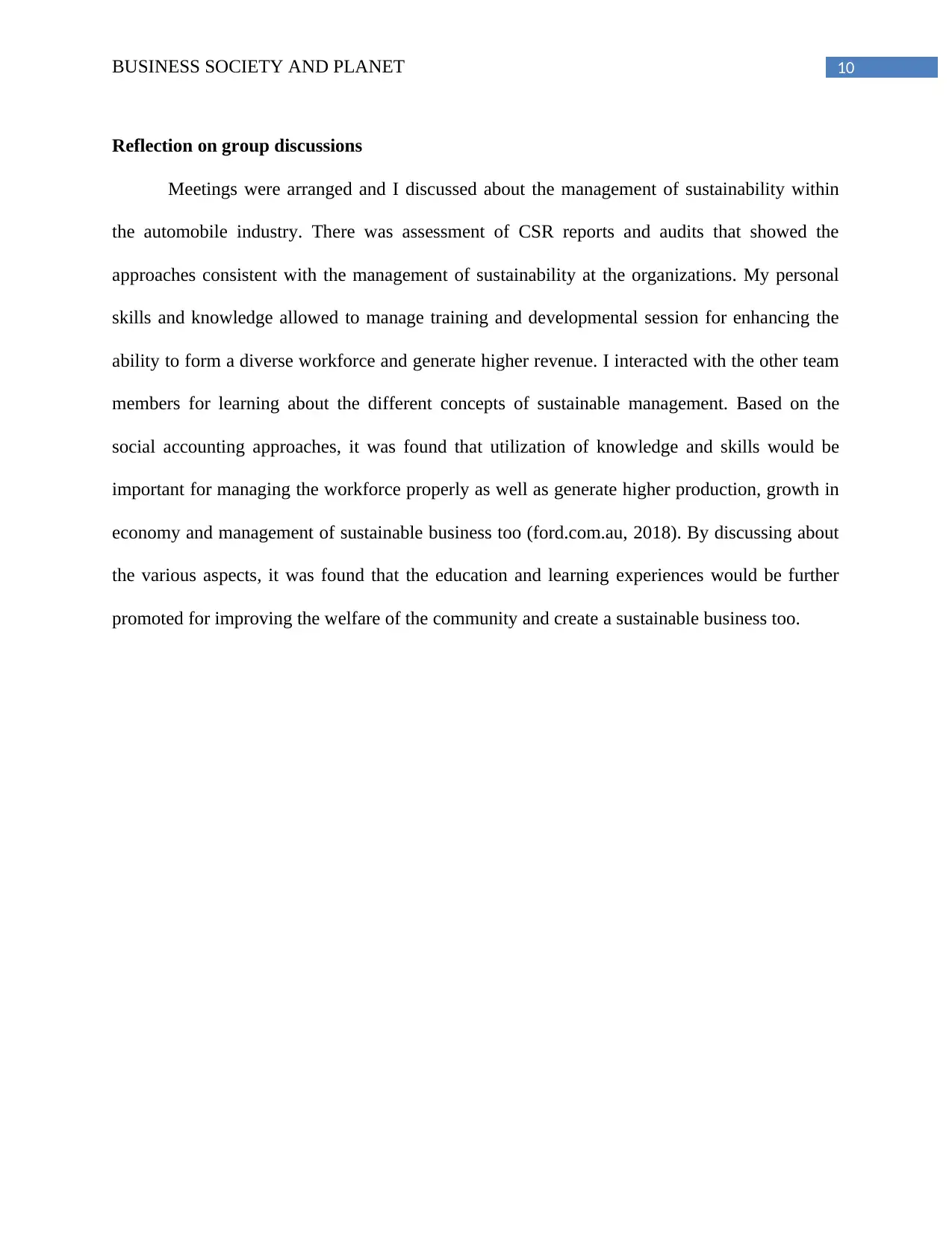
10BUSINESS SOCIETY AND PLANET
Reflection on group discussions
Meetings were arranged and I discussed about the management of sustainability within
the automobile industry. There was assessment of CSR reports and audits that showed the
approaches consistent with the management of sustainability at the organizations. My personal
skills and knowledge allowed to manage training and developmental session for enhancing the
ability to form a diverse workforce and generate higher revenue. I interacted with the other team
members for learning about the different concepts of sustainable management. Based on the
social accounting approaches, it was found that utilization of knowledge and skills would be
important for managing the workforce properly as well as generate higher production, growth in
economy and management of sustainable business too (ford.com.au, 2018). By discussing about
the various aspects, it was found that the education and learning experiences would be further
promoted for improving the welfare of the community and create a sustainable business too.
Reflection on group discussions
Meetings were arranged and I discussed about the management of sustainability within
the automobile industry. There was assessment of CSR reports and audits that showed the
approaches consistent with the management of sustainability at the organizations. My personal
skills and knowledge allowed to manage training and developmental session for enhancing the
ability to form a diverse workforce and generate higher revenue. I interacted with the other team
members for learning about the different concepts of sustainable management. Based on the
social accounting approaches, it was found that utilization of knowledge and skills would be
important for managing the workforce properly as well as generate higher production, growth in
economy and management of sustainable business too (ford.com.au, 2018). By discussing about
the various aspects, it was found that the education and learning experiences would be further
promoted for improving the welfare of the community and create a sustainable business too.
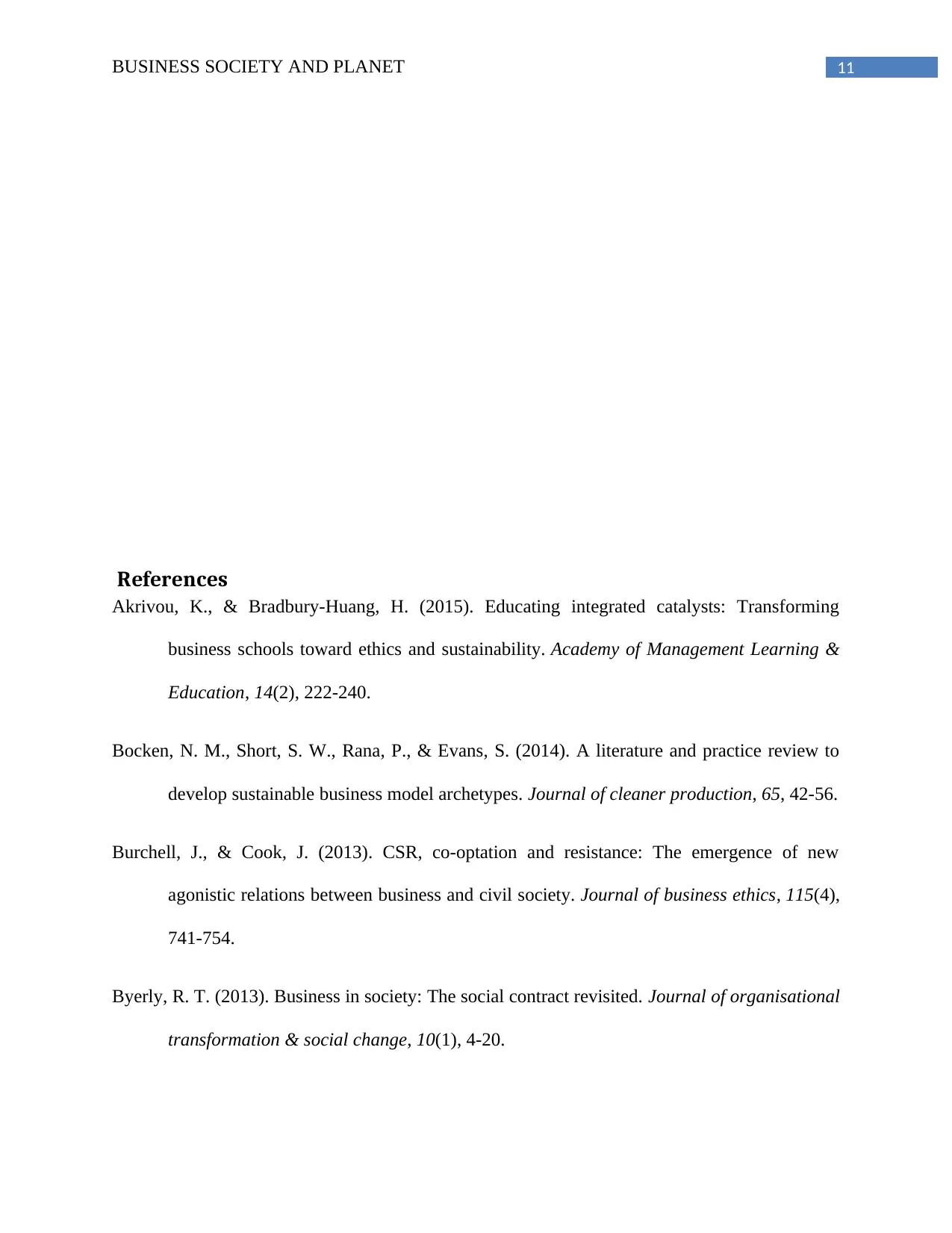
11BUSINESS SOCIETY AND PLANET
References
Akrivou, K., & Bradbury-Huang, H. (2015). Educating integrated catalysts: Transforming
business schools toward ethics and sustainability. Academy of Management Learning &
Education, 14(2), 222-240.
Bocken, N. M., Short, S. W., Rana, P., & Evans, S. (2014). A literature and practice review to
develop sustainable business model archetypes. Journal of cleaner production, 65, 42-56.
Burchell, J., & Cook, J. (2013). CSR, co-optation and resistance: The emergence of new
agonistic relations between business and civil society. Journal of business ethics, 115(4),
741-754.
Byerly, R. T. (2013). Business in society: The social contract revisited. Journal of organisational
transformation & social change, 10(1), 4-20.
References
Akrivou, K., & Bradbury-Huang, H. (2015). Educating integrated catalysts: Transforming
business schools toward ethics and sustainability. Academy of Management Learning &
Education, 14(2), 222-240.
Bocken, N. M., Short, S. W., Rana, P., & Evans, S. (2014). A literature and practice review to
develop sustainable business model archetypes. Journal of cleaner production, 65, 42-56.
Burchell, J., & Cook, J. (2013). CSR, co-optation and resistance: The emergence of new
agonistic relations between business and civil society. Journal of business ethics, 115(4),
741-754.
Byerly, R. T. (2013). Business in society: The social contract revisited. Journal of organisational
transformation & social change, 10(1), 4-20.
⊘ This is a preview!⊘
Do you want full access?
Subscribe today to unlock all pages.

Trusted by 1+ million students worldwide
1 out of 14
Related Documents
Your All-in-One AI-Powered Toolkit for Academic Success.
+13062052269
info@desklib.com
Available 24*7 on WhatsApp / Email
![[object Object]](/_next/static/media/star-bottom.7253800d.svg)
Unlock your academic potential
Copyright © 2020–2026 A2Z Services. All Rights Reserved. Developed and managed by ZUCOL.





